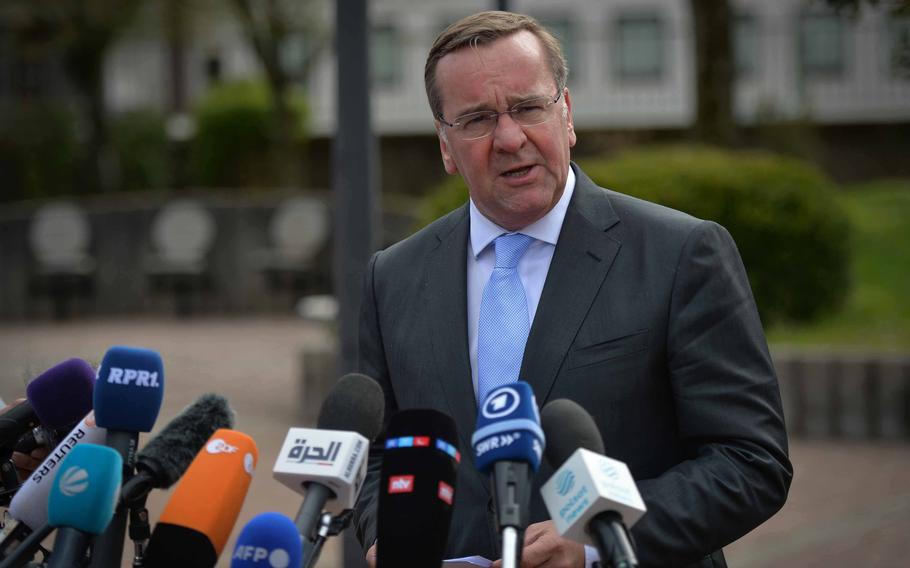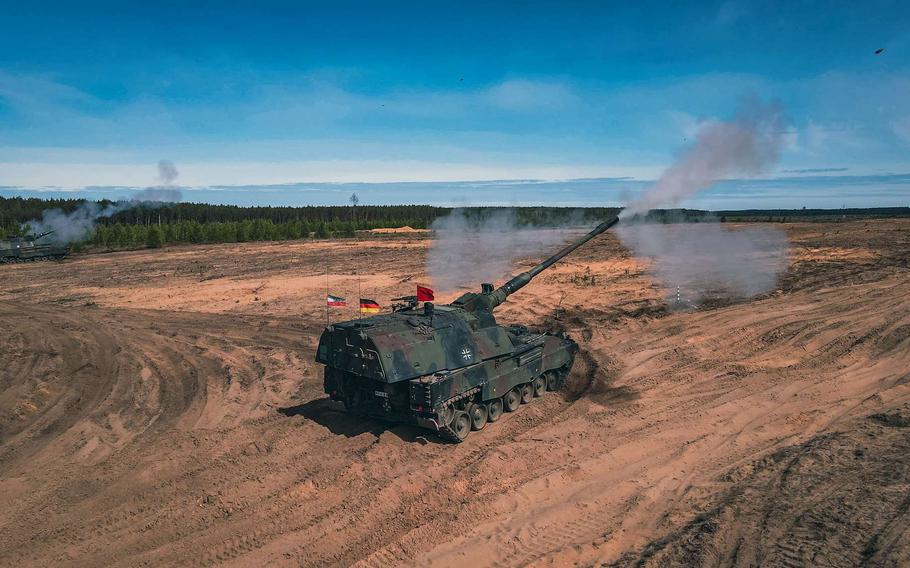
German Defense Minister Boris Pistorius briefs the media during the Ukraine Defense Contact Group meeting April 21, 2023, at Ramstein Air Base in Germany. Pistorius said in June that his government is committed to meeting the NATO threshold of spending 2% of gross domestic product on defense. (Alexander Riedel/Stars and Stripes)
Germany is scrapping plans to commit to meeting the NATO threshold of spending 2% of gross domestic product on defense, according to news reports.
Chancellor Olaf Scholz’s government had announced its intention to enshrine the defense spending target into law, given the heightened security concerns in Europe following Russia’s invasion of Ukraine in February 2022.
But a clause committing the country to it was deleted from a draft of the budget financing law before the Cabinet passed it Wednesday, Reuters and the German newspaper Sueddeutsche Zeitung reported, citing unidentified government sources.
The omission means Berlin can continue its existing strategy of meeting the 2% goal on average over a five-year period. However, the German government has vowed to still meet the 2% target despite not being legally obligated to.

A German Panzerhaubitze 2000 howitzer fires during training in Lithuania as part of NATO’s enhanced forward presence in July. Last month, heads of state and government participating in the NATO summit in Lithuania pledged to boost spending on defense. (NATO)
In recent years, the U.S. and other NATO allies have criticized Germany heavily for failing to meet the alliance’s voluntary 2% target. It spent around 1.5% of its GDP on defense last year, according to government figures.
But the start of the Russia-Ukraine war led Scholz to announce sweeping changes to Germany’s defense and foreign policies.
“From now on, we will invest more than 2% of the GDP into our defense year after year,” Scholz said at the time.
The Defense Ministry backed efforts to enact the commitment into law, but the Foreign Affairs Ministry opposed the move, saying the current legal status is adequate, Sueddeutsche Zeitung reported.
According to alliance data, only seven NATO countries hit the 2% mark last year: the U.S., Estonia, Greece, Latvia, Lithuania, Poland and the United Kingdom.
In 2020, President Donald Trump threatened Germany with unspecified trade sanctions and announced plans to withdraw about 12,000 American troops from the country because Berlin wasn’t meeting the target.
Roughly 36,000 U.S. service members were in Germany at the time.
“We don’t want to be suckers anymore,” Trump told reporters at the White House in July 2020. “We’re reducing the force because they’re not paying their bills. It’s very simple.”
President Joe Biden, Trump’s successor, stopped the planned withdrawal shortly after assuming office. Roughly the same amount of American troops are in Germany today as were in the country during Trump’s presidency.
Last month, allied leaders attending the NATO summit in Lithuania pledged to boost spending on defense to cover things like modern weapons and missions.
“We affirm that in many cases, expenditure beyond 2% of GDP will be needed in order to remedy existing shortfalls and meet the requirements across all domains arising from a more contested security order,” the leaders said in a statement.